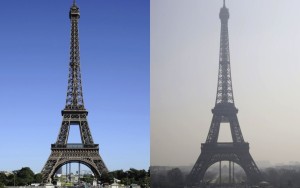By Adam Rubenfire
Dangerously high pollution levels this past week prompted officials in Paris to take some drastic measures to curb the city’s smog problem.
The most radical measure came Monday. About half of the city’s cars were forced off Parisian streets when the French government announced that vehicles with even-numbered license plates would not be allowed to drive within the limits of the city or its suburbs.
Taxis, carpools, and commercial electric or hybrid vehicles were exceptions to the rule, which, combined with favorable weather conditions, appeared to alleviate the smog that consumed the Paris skyline, according to the BBC.
Although thousands of individuals faced ticketing for violating the ban — some less cooperative motorists even had their cars impounded — there was an upside for commuting Parisians. All forms of public transit were free of charge from Friday through Tuesday.
The 100 percent discount on fares cost the region four million Euros a day ($5.5 million), according to online publication The Local.
Loosening the turnstiles and taking automobiles off the roads may seem extreme, but car free streets are the norm in some communities around the globe.
On Mackinac Island, a popular tourist destination in Michigan, only emergency and specially permitted vehicles are allowed on the road. Citing the island’s prevalence as a natural landmark and its historic dependence on horse-drawn carriages, the city code notes that motorized vehicles “pose a significant and potentially detrimental effect on the health, safety and welfare of the general public.”
Motor vehicles are also prohibited in the city center of Freiburg im Breisgrau, Germany, where a tram and city buses shuttle the city’s residents around town. Residents can join a car-sharing club if they need a vehicle, or they can store their personal car in large parking garages on the outskirts of the city, according to an article about this “super-green” city in The Guardian.
And while not every city chooses to close down its roadways to cars, many cities have promoted walking and biking by imposing car-free periods on city streets.
- During the Summer Streets program in New York City, roughly seven miles of streets spanning the lower half of Manhattan are closed down to allow for walking, biking and recreational activities during three consecutive Saturdays in the summer.
- Portland, Ore.’s Sunday Parkways encourage alternative forms of transportation by closing down select streets throughout the city at several points during the summer months.
- The organizers of World Carfree Day encourage similar functions on or around September 22 every year.
That begs the question: what would happen if other cities limited car use within their limits for half a day or even a full day? What if they went car-free, or limited street use to buses and alternative fuel vehicles? Much like struggling governments enact furlough days to cut costs, could city streets have furlough days to alleviate pollution?
I’d love to hear your thoughts on these questions in the comments section — I’ll monitor the conversation and chime in.

